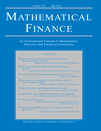
MATHEMATICAL FINANCE
Scope & Guideline
Bridging Disciplines for Financial Excellence
Introduction
Aims and Scopes
- Quantitative Risk Management:
The journal emphasizes rigorous mathematical and statistical methods for assessing and managing financial risk, including market, credit, and operational risks. - Stochastic Modeling:
Research includes the development of stochastic models to describe the dynamics of financial markets, including asset prices, interest rates, and volatility. - Portfolio Optimization:
Papers often explore advanced techniques for optimizing investment portfolios under various constraints and market conditions. - Machine Learning and AI Applications:
The journal showcases innovative applications of machine learning and artificial intelligence in finance, such as algorithmic trading, risk assessment, and predictive analytics. - Game Theory and Economic Equilibria:
Research frequently incorporates game-theoretic approaches to understand competitive behaviors in financial markets and establish equilibrium concepts. - Derivatives Pricing and Hedging:
A core focus is on the pricing and hedging of financial derivatives using sophisticated mathematical techniques and models.
Trending and Emerging
- Deep Learning and AI in Finance:
There is a growing trend towards utilizing deep learning techniques for various applications in finance, including asset pricing, risk management, and algorithmic trading, reflecting the industry's interest in harnessing big data. - Systemic Risk and Financial Stability:
Research increasingly addresses systemic risk and the implications of interconnected financial systems, particularly in the context of multiple central counterparties and the stability of financial markets. - Dynamic and Time-Inconsistent Models:
There is an emerging focus on dynamic models that account for time-inconsistency in decision-making, which is crucial for realistic modeling of investor behavior and market dynamics. - Reinforcement Learning Applications:
Reinforcement learning is becoming a prominent area of study, with applications in optimal trading strategies, market simulations, and risk management, showcasing its potential to revolutionize traditional finance methodologies. - Multi-Agent Systems and Market Simulations:
Research on multi-agent systems is gaining traction, particularly in simulating over-the-counter markets and understanding interactions among heterogeneous agents.
Declining or Waning
- Traditional Asset Pricing Models:
There is a noticeable decrease in the focus on classical asset pricing models, suggesting a shift towards more complex, data-driven approaches that incorporate machine learning and other modern techniques. - Static Risk Measures:
Static risk measures, such as Value-at-Risk, which previously received significant attention, are being overshadowed by dynamic and robust risk measures that account for changing market conditions. - Simple Hedging Strategies:
Research on basic hedging strategies appears to be waning, as the focus shifts towards more sophisticated and adaptive strategies that incorporate real-time data and machine learning.
Similar Journals
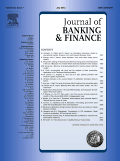
JOURNAL OF BANKING & FINANCE
Exploring Innovations in Finance and EconomicsWelcome to the Journal of Banking & Finance, a premier publication in the fields of finance and economics, expertly published by Elsevier. With its esteemed Q1 ranking in both the Economics and Econometrics and Finance categories for 2023, this journal frequently garners significant attention from researchers, professionals, and academics alike. Established in 1977, it has become a crucial resource for the latest research and advancements in banking and financial services, influencing policies and practices on a global scale. The journal's commitment to high-quality, peer-reviewed content ensures that it not only contributes to academic discourse but also drives real-world financial innovation. As part of the respected Elsevier publishing collection, the journal's rigorous standards and comprehensive analysis serve as indispensable tools for those seeking to understand and navigate the complexities of the financial landscape. Located in the Netherlands, the Journal of Banking & Finance continues to play a vital role in shaping the future of financial research through its impactful insights and research contributions.

FINANCE AND STOCHASTICS
Exploring the Nexus of Finance and ProbabilityFinance and Stochastics is a leading academic journal published by Springer Heidelberg, focusing on the intricate interplay of finance, probability, and statistics. With an impressive impact factor and ranked within the Q1 category in both finance and statistics, it serves as an essential resource for researchers and professionals seeking to advance their understanding of stochastic modeling in financial contexts. The journal has maintained a strong reputation since its inception, with contributions from renowned scholars worldwide. The editorial team prioritizes high-quality research that addresses contemporary challenges in financial mathematics and extends the boundaries of statistical methods. Nestled in the heart of Germany, Finance and Stochastics embraces a broad scope, inviting submissions that explore innovative approaches to economic theory and quantitative methodologies. This combination of rigorous academic standards and commitment to impactful research makes the journal a pivotal avenue for disseminating knowledge and fostering collaboration in the finance and statistics communities.

JAPAN JOURNAL OF INDUSTRIAL AND APPLIED MATHEMATICS
Transforming Ideas into Mathematical SolutionsThe Japan Journal of Industrial and Applied Mathematics, published by Springer Japan KK, is a pivotal platform for disseminating cutting-edge research in the fields of applied mathematics and engineering. With an ISSN of 0916-7005 and an E-ISSN of 1868-937X, this journal has been a cornerstone in the academic community since its inception in 1991 and will continue to contribute pivotal insights through 2024. Positioned in the Q3 category for both Applied Mathematics and Miscellaneous Engineering according to 2023 rankings, it is recognized for its diverse range of topics and interdisciplinary approaches. Despite its competitive ranking, the journal fosters valuable contributions that challenge conventional methodologies and inspire innovation. Researchers, professionals, and students alike will find the journal’s contents invaluable for advancing knowledge and exploring new methodologies in industrial and applied mathematics.
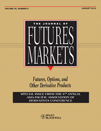
JOURNAL OF FUTURES MARKETS
Illuminating the Path of Economic FuturesThe JOURNAL OF FUTURES MARKETS, published by WILEY, stands at the forefront of research in the fields of accounting, economics, finance, and business management. With an ISSN of 0270-7314 and E-ISSN 1096-9934, the journal has been a key academic resource since its inception in 1981, with content converging up to 2024. It is recognized for its rigorous peer-review process and maintains a strong presence in the academic community, holding a Q2 ranking in multiple categories such as accounting and finance, according to the latest 2023 evaluations. With a reputable Scopus ranking, where it ranks in the 65th percentile for economics and econometrics, this journal is essential reading for researchers, professionals, and students alike who seek to explore the complexities of future markets. While not an open-access publication, it offers various subscription options that make cutting-edge research accessible to a broad audience, fostering a deeper understanding of market dynamics and trends.

Pacific-Basin Finance Journal
Empowering Researchers with Cutting-Edge Finance InsightsPacific-Basin Finance Journal is a prestigious academic journal that focuses on critical developments and innovative research within the fields of finance and economics, specifically tailored to the Pacific region's unique economic landscape. Published by Elsevier, the journal boasts an impressive impact factor and is categorized in the Q1 quartile for both Economics and Econometrics and Finance as of 2023. This indicates its high relevance and position among the top journals in its field, with Scopus rankings reflecting a strong standing in the competitive landscape of finance research, holding the 45th position out of 317 in Finance and the 108th in Econometrics. Established in 1993, the journal is committed to disseminating rigorous theoretical and empirical research findings that enhance the understanding of financial systems in the Pacific Basin. Although the journal is not open access, it provides invaluable insights and comprehensive studies aimed at professionals, researchers, and students alike, fostering a deeper comprehension of the region's economic dynamics and global interconnectedness.

Journal of Investment Management
Transforming Investment Practices with Empirical Rigor.The Journal of Investment Management, with ISSN 1545-9144 and E-ISSN 1545-9152, is a prominent platform dedicated to the dissemination of cutting-edge research in the field of investment management. Published by JOURNAL INVESTMENT MANAGEMENT, this journal aims to bridge the gap between theoretical foundations and practical applications, catering to the needs of researchers, professionals, and students alike. With a focus on contemporary issues influencing investment strategies, asset allocation, risk management, and financial innovation, this journal provides valuable insights and methodologies to enhance investment decision-making processes. While currently not operating under an open-access model, the journal is accessible through various academic databases, ensuring that its critical findings reach a wide audience across the globe. Emphasizing the significance of empirical research and analytical rigor, the Journal of Investment Management plays a crucial role in shaping the future of investment practices and academic discourse in this dynamic field.
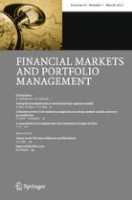
Financial Markets and Portfolio Management
Transforming Ideas into Investment Strategies.Financial Markets and Portfolio Management is a renowned peer-reviewed journal published by Springer, focusing on the dynamic and evolving intersections of finance, economics, and accounting. With an ISSN of 1934-4554 and an e-ISSN of 2373-8529, the journal provides a platform for innovative research on financial markets, investment strategies, and portfolio management techniques. It boasts an impactful presence in the academic community, with a Scopus ranking placing it in the 58th percentile in Finance and the 51st percentile in Accounting, underscoring its significance in both fields. Spanning coverage from 2006 to 2024, the journal offers essential insights for researchers, practitioners, and students interested in the latest developments and empirical analyses in financial practices. Although it does not offer open access options, its rigorous editorial standards ensure high-quality content accessible to library and institutional resources. The journal plays a pivotal role in advancing knowledge and fostering dialogue in an increasingly complex financial landscape.
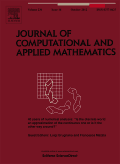
JOURNAL OF COMPUTATIONAL AND APPLIED MATHEMATICS
Empowering Innovation Through Computational InsightsJOURNAL OF COMPUTATIONAL AND APPLIED MATHEMATICS, published by Elsevier, stands as a premier platform for researchers and practitioners in the fields of applied and computational mathematics. With an impressive convergence history from 1975 to 2025, this journal has established itself as a crucial reference point for innovative mathematical theories, methodologies, and applications. Holding a distinguished position in Scopus rankings—#85 out of 635 in Applied Mathematics and #36 out of 189 in Computational Mathematics—it operates in the highly competitive Q2 quartile for both disciplines as of 2023. Although currently not designated as an open-access journal, it remains widely respected for its rigorous peer-review process and high-quality research contributions. Researchers and professionals seeking to advance their work and engage with cutting-edge developments will find this journal an invaluable resource, fostering a deeper understanding and collaboration within the mathematical community.
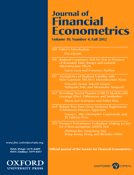
Journal of Financial Econometrics
Pioneering methodologies for a deeper economic understanding.Journal of Financial Econometrics, published by Oxford University Press, stands as a leading academic journal in the fields of financial economics and econometrics. With an impressive impact factor and a ranking in the Q1 quartile for both Economics and Finance categories in 2023, this journal is recognized for its contribution to advancing theoretical and applied methodologies in financial econometric analysis. It publishes high-quality research that addresses critical issues in finance, aiming to foster a deeper understanding of the economic factors influencing financial markets and instruments. Researchers and practitioners alike benefit from its rigorous peer-reviewed articles, which are invaluable resources for both academic scholars and finance professionals. The journal’s content typically spans pioneering techniques in econometric modeling, empirical analysis of financial instruments, and innovative applications of econometric theory in real-world scenarios. Operating out of the United Kingdom, the journal continues to serve as a vital platform for disseminating significant research findings from 2005 to 2024, ensuring that the latest advancements in the field are accessible to its audience.

SIAM Journal on Financial Mathematics
Elevating Financial Analysis with Cutting-Edge MathematicsThe SIAM Journal on Financial Mathematics, published by SIAM PUBLICATIONS, is a premier journal dedicated to the intersection of applied mathematics and finance. With an ISSN of 1945-497X, this journal serves as a vital platform for the dissemination of innovative research that addresses complex financial problems through mathematical modeling and analytical techniques. The journal has established itself within the Q2 quartile in the categories of Applied Mathematics, Finance, and Numerical Analysis, reflecting its influence and significance in these fields. Researchers and practitioners will find a wealth of knowledge spanning topics from stochastic calculus to quantitative finance, making it essential for anyone aiming to advance their understanding of financial mathematics. As the journal continues to converge from 2010 to 2024, it promises to remain a cornerstone resource for academics, professionals, and students alike, facilitating the ongoing dialogue between mathematics and its applications in the financial industry.